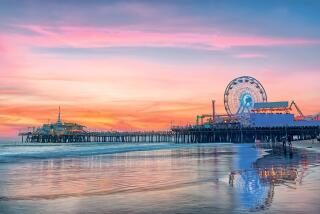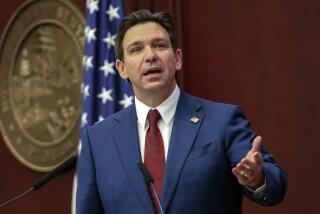Frisky Ft. Lauderdale, Trying to Live Down Its Past, Goes After a ‘G’ Rating
- Share via
FT. LAUDERDALE, Fla. — Business remains brisk at a topless check-cashing service, and there’s talk of resuming semi-nude car washes. For a $2 cover charge, a bare-breasted waitress will serve you coffee and doughnuts at a shop near the airport.
Off the interstate, brothels thinly disguised as “gentlemen’s retreats” advertise in neon all-girl staffs and round-the-clock hours. Male and female prostitutes walk the palm-dotted beach.
Yet the permissive atmosphere has dissipated a bit recently in this South Florida city known as a freewheeling party town since Connie Francis sang “Where the Boys Are” 30 years ago.
Little more than memory remains of that Lauderdale, and now some officials and outspoken residents are taking aim at the surviving risque diversions. They say it is time Ft. Lauderdale grew up, too.
“It’s not a morality issue, it’s an image issue,” City Commissioner Sheila Harrigan said last month before the five-member board voted unanimously to ban liquor from clubs that offer nude entertainment.
That controversial method of taming the city’s seven adult nightclubs is but the latest effort to reduce crime and recast Ft. Lauderdale as a family-oriented environment.
More and more each year, the winter influx of tourists from the north favors the wholesome Walt Disney World in Orlando.
“It’s true that Disney and the other theme parks are competition, but we’re trying to tie into that market,” said Francine Mason of the Greater Ft. Lauderdale Convention and Visitors Bureau. “Disney, after all, doesn’t have a beach.”
That stretch of sand was the scene of the first skirmishes between partying college students and police. In the mid-1980s, an intense crackdown began to break up the traditional Spring Break, an annual bacchanal that once drew up to 350,000 students to the sub-tropical sunshine here.
With spring break crowds now going to Daytona Beach, South Padre Island in Texas and other spots, Ft. Lauderdale officials have turned their attention to the seamy side of town.
The adult bookstores and peep shows have been zoned out of the city limits. New ordinances set limits on radio volume and on driving along the beach strip, where patrol cars sit with pulsing blue lights to warn cruisers away.
“You cannot, by legislation, make people morally pure and holy,” said the Rev. James Kennedy, pastor at Coral Ridge Presbyterian Church. “But government can control the baser instincts of man. Rape and murder are immoral, so we have laws against them.”
“We’re slowly cleansing the city of its not-clean elements,” Mayor Robert Cox said.
Critics of the crusade are easy to find, however.
Owners of businesses along the beach strip--a tawdry collection of T-shirt shops, hotels and hard-drinking bars--have vowed to battle a proposal to raze their property for redevelopment. A complex of boutiques and cafes, similar to the gentrification of Miami Beach about 20 miles south, is planned.
The city has hired consultants and commissioned an international campaign to publicize the new downtown, site of projects such as a $52.6-million performing arts center and a $29-million science complex. Officials are considering adding a 64-story building to the growing skyline.
Signs everywhere proclaim Ft. Lauderdale’s goal of becoming the best city of its size by 1994.
“Image. That’s all I hear is image,” says Dante Scola, owner of the Playmate Lounge, a nude dance club. “The image I have is of a city that’s trying to change itself by making a lot of rules.”
“All of a sudden Lauderdale got religion,” says Eric Murray, sitting on a stool at R Donuts, a coffee shop with topless waitresses. “This town built itself on being a party place. You take the fun out of Lauderdale and you’re left with nothing.”
Tourism experts have been slow to catch on to the new Ft. Lauderdale.
“I wouldn’t see Ft. Lauderdale as your typical family destination,” says Bill Carlson, marketing research director for Holiday Corp., which owns the Holiday Inn and Embassy Suites hotel chains. “When I think of Ft. Lauderdale, I think college students and spring break.”
“It seems like the place to go for a good time,” says Julie Northcutt of the Atlanta Convention and Visitors Bureau. “All I know is my father always called it ‘Fort Liquor-dale.”’
Television cameras also have put the city’s serious crime and drug problems on display. Earlier this year, the syndicated police show “Cops” followed Broward County sheriff’s deputies through mean streets rarely seen by tourists.
In April, city officials withdrew permits for a film documentary about a young runaway in Ft. Lauderdale after they read the script.
Mason, however, notes that a record 3.5 million visitors came to Broward County last year, and there was a substantial increase in the number of foreign tourists.
“They don’t have a negative image about Ft. Lauderdale because they have never heard of spring break,” she says.
The nude entertainment issue could be the turning point in the evolution of Ft. Lauderdale.
Opponents say the ordinance may set the tone for further restrictions on establishments that are open late or feature spectacles such as wet T-shirt contests.
M. J. Peter Club Management, which operates two Ft. Lauderdale clubs and others, from the East Coast to Honolulu, is challenging the ordinance as a violation the First Amendment rights.
City officials note that the ordinance is fashioned after a Daytona Beach measure, which was upheld by the Florida Supreme Court.
“There’s a lot of case law involving this issue and it seems we’re on solid legal ground,” says Commissioner Doug Danziger, an insurance agent and Coral Ridge church member who introduced the anti-nude bar ordinance. He was one of two commissioners to report receiving threats during the four-month controversy.
Even if the court challenge fails, the nude bars have threatened a sleaze counterattack. Peter told commissioners he has leased 18 sites, one next to Danziger’s office, and will open steamy, no-alcohol sex clubs to make up for lost liquor revenue.
“It’s a matter of economics,” Peter said. “You are creating a nightmare for Ft. Lauderdale. . . . I will do what I have to to stay alive.”
More to Read
Sign up for The Wild
We’ll help you find the best places to hike, bike and run, as well as the perfect silent spots for meditation and yoga.
You may occasionally receive promotional content from the Los Angeles Times.






